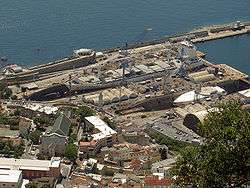Gibdock
Coordinates: 36°07′35″N 5°21′13″W / 36.126412°N 5.353567°W
 | |
| Private company | |
| Industry |
Shipbuilding Marine engineering |
| Genre | Shipyard services |
| Predecessor | Cammell Laird |
| Founded | Main Wharf Road, Gibraltar Dockyard, Gibraltar (1904) |
| Founder | Royal Navy |
| Headquarters | Main Wharf Road, Gibraltar Dockyard, Gibraltar |
Area served | Gibraltar |
Key people |
Joseph Corvelli (CEO) Richard Beards Commercial Director (President) |
| Services | Ship repair |
| Website | Gibdock.com |


Gibdock is a shipyard in the British overseas territory of Gibraltar. It formerly operated as a Royal Navy Dockyard.
Royal Navy Dockyard
HM Dockyard, Gibraltar was first developed in the 18th century. After the Capture of Gibraltar, victualling facilities were provided from a small quay around what is now the North Mole, but a lack of berths prevented further development. In the 1720s, however, the building of the South Mole was accompanied by the establishment of a small dockyard facility consisting of a careening wharf, mast house and various workshops. The yard remained relatively small in scale for a century and a half, although coaling facilities were added in the 1840s.
In 1871 Captain Augustus Phillimore made the proposal that a new naval dockyard should be constructed in Gibraltar. Phillimore's scheme lied dormant in the Admiralty for 22 years before it was put to Parliament in 1895. The idea was to take five years and just under £1.5m pounds. In 1896 the scheme was further extended with the creation of new moles and three dry docks and a new budget of £4.5m pounds. The transformation was large and the government were still passing enabling legislation in 1905.[1]
The dry docks
The three large graving docks initially known as docks Number 1, 2 and 3, were excavated on what had been the site of the old naval yard. Number 3 dock, the smallest at just over 50,000 tons of water capacity, was the first to be named in 1903 and was named King Edward VII, Queen Alexandra named the 60,000 ton Number 2 dock after herself in 1906, and the largest, Number 1 dock, which could hold over 100,000 tons of water, was called the Prince and Princess of Wales dock, having been named by their Royal Highnesses in 1907, subsequently King George V and Queen Mary.[2]
In 1937 the warning of the Chiefs of Staff gave way to rearmament. The danger of a war being settled in the Mediterranean meant that No. 1 and No. 2 dock were extended so that Gibraltar could handle aircraft carriers and the new larger battleships.[2]
Civilian ownership
The dockyard was used extensively by the Royal Navy, docking many of the Navy’s most prestigious ships. In the early 1980s a decision by the United Kingdom's Ministry of Defence to cut back the Royal Navy surface fleet meant that the dockyard was no longer financially viable.
In 1982 the dockyard passed into the hands of the UK ship repair and conversion company, A&P Group. A government grant and a prospect of lucrative Royal Fleet Auxiliary refit contracts did not help A&P Group however and they passed the yard into the hands of the Government of Gibraltar.
A company was set up to run the yard and it became known as Gibraltar Ship Repair. In the early 1990s the dockyard was taken over by Norway-based engineering and construction services company, Kværner, who ran the yard until 1996, the yard then closed for a period of approximately 18 months.
Cammell Laird
In 1997 the British shipbuilding company Cammell Laird based in Merseyside, were looking to expand their operations outside the UK and in early 1998 a management team arrived at Gibraltar. The yard was reopened and the first ship docked within a few weeks. The dockyard's future was again put at risk when in early 2001 Cammell Laird Group PLC ran into difficulties, which eventually led to its closure.
When it became inevitable that Cammell Laird Group PLC was to close, senior management in Gibraltar, with the backing of the Government of Gibraltar, were successful in their quest to source the necessary financial assistance to keep the company's Gibraltar operations running.
Renaming to Gibdock
During the first quarter of 2006, Cammell Laird Group was sold in its entirety to private investors. The new owner's intention was to continue with the existing business. The company continued to trade as Cammell Laird Gibraltar Ltd until 7 December 2009 when it was renamed Gibdock following the sale of the rights in the historic brand to Northwestern Shiprepairers & Shipbuilders in the UK for an undisclosed sum.[3]
At present
Gibdock currently remains a ship repair and conversion facility, providing repair services to all sectors of the maritime industry.
References
- ↑ Finlayson, Darren Fa & Clive (2006). The fortifications of Gibraltar : 1068-1945 (1. publ. in Great Britain. ed.). Oxford [u.a.]: Osprey. p. 40. ISBN 9781846030161.
- 1 2 Jackson, Sir William G. F. (1990). The rock of the Gibraltarians : a history of Gibraltar (2nd ed.). Grendon: Gibraltar Books. pp. 257–273. ISBN 0948466146.
- ↑ Gibraltar Chronicle - Cammell Laird Gibraltar becomes 'Gibdock'